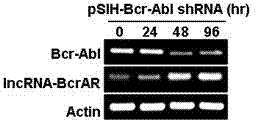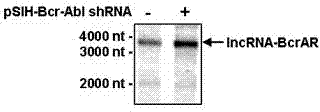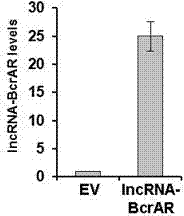Long-chain non-coding RNA IncRNA-BcrAR and application thereof in cell canceration resistance
A long-chain non-coding, pmscv-lncRNA-bcrar technology, applied in non-coding RNA and its application fields, to achieve the effect of promoting cell apoptosis and inhibiting tumor growth
- Summary
- Abstract
- Description
- Claims
- Application Information
AI Technical Summary
Problems solved by technology
Method used
Image
Examples
Embodiment 1
[0025] Example 1. Expression of lncRNA-BcrAR in human chronic myelogenous leukemia cell lines
[0026] 1. Expression of lncRNA-BcrAR in human chronic myelogenous leukemia cell line K562
[0027] Using lncRNA chip to detect the expression of lncRNA in K562 cells, the expression of lncRNA-BcrAR was significantly up-regulated after artificially interfering with the Bcr-Abl gene in K562 cells, suggesting that lncRNA-BcrAR may be involved in the process of malignant transformation of cells induced by Bcr-Abl. The nucleotide sequence shown in SEQ ID NO:3 encodes the lncRNA-BcrAR gene, and the gene position is Chromosome 11; 5265784-5269453.
[0028] 2. Construction of K562 cell line interfering with Bcr-Abl gene
[0029] 1. Construction of plasmid pSIH-Bcr-Abl shRNA carrying Bcr-Abl-specific shRNA
[0030] The expression of shRNA by lentiviral vector pSIH-H1 was used to interfere with the Bcr-Abl gene in K562 cells. Synthesize the single-stranded DNA shown in the following sequen...
Embodiment 2
[0046] Example 2, the application of lncRNA-BcrAR in anti-chronic myelogenous leukemia
[0047] 1. Northern blot to determine the presence of lncRNA-BcrAR in K562 cells
[0048] Total RNA was extracted from K562 cells, cDNA was synthesized by reverse transcription, primers for Northern blot probe amplification were designed, and cDNA was used as a template for PCR amplification to obtain PCR amplification products.
[0049] lncRNA-BcrAR-NB-F: 5'-TTAGCAGTAACTGCTGAATTCCTGG-3';
[0050] lncRNA-BcrAR-NB-R: 5'-AAGGGGAAAACTGGGTTTTATTAC-3'.
[0051] The PCR amplification product was recovered, subjected to isotope labeling, and the length of lncRNA-BcrAR in K562 cells was detected by Northern blot method (Invitrogen). Such as figure 2 As shown, lncRNA-BcrAR exists in the form of transcripts with a length of about 3670 nt in K562 cells, and the infection of pSIH-Bcr-Abl shRNA packaging virus can significantly up-regulate the expression of lncRNA-BcrAR in K562 cells.
[0052] 2. E...
Embodiment 3
[0068] Example 3, the application of lncRNA-BcrAR in anti-A-MuLV-induced mouse leukemia
[0069] 1. Establishment of BC44 cell line (A-MuLV transformed mouse leukemia cells) overexpressing lncRNA-BcrAR
[0070] 1. Virus packaging
[0071] According to the instructions of Lipofectamine (Invitrogen) transfection reagent, the plasmid pMSCV-lncRNA-BcrAR carrying lncRNA-BcrAR and the packaging plasmid pCL-Eco (IMGENEX) and VSVG (Invitrogen) were co-transfected into the packaging cell line 293T packaging virus. 293T cells were cultured in DMEM (Gibco) medium, with a final concentration of 100 units / mL penicillin, 100 units / mL streptomycin and 10% fetal bovine serum (Gibco) added to the complete medium, placed at 37°C, saturated humidity, 5 %CO 2 concentration in the cell culture incubator. After 48-96 h, the cell supernatant was collected, and the supernatant contained pseudoviral particles encoding lncRNA-BcrAR.
[0072] 2. Cell infection
[0073] Collect, filter the virus liq...
PUM
 Login to View More
Login to View More Abstract
Description
Claims
Application Information
 Login to View More
Login to View More - R&D
- Intellectual Property
- Life Sciences
- Materials
- Tech Scout
- Unparalleled Data Quality
- Higher Quality Content
- 60% Fewer Hallucinations
Browse by: Latest US Patents, China's latest patents, Technical Efficacy Thesaurus, Application Domain, Technology Topic, Popular Technical Reports.
© 2025 PatSnap. All rights reserved.Legal|Privacy policy|Modern Slavery Act Transparency Statement|Sitemap|About US| Contact US: help@patsnap.com



